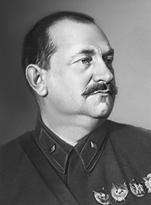Vladimir Stavsky
| Vladimir Petrovich Stavsky | |
|---|---|
 | |
| Born |
Владимир Петрович Кирпичников July 30, 1900 Penza, Russian Empire |
| Died |
November 14, 1943 (aged 43) Nevel, Pskov Oblast, USSR |
| Occupation |
writer editor literary administrator |
| Years active | 1924–1943 |
| Awards |
Order of the Red Banner (twice) Order of Lenin |
Vladimir Petrovich Stavsky (Владимир Петрович Ставский; born Kirpichnikov, Кирпичников; July 30, 1900 – November 14, 1943) was a Soviet Russian writer, editor (in 1937–1941, of Novy Mir) and literary administrator, the head of the Soviet Union of Writers in 1936–1941. As World War II broke out, Stavsky relinquished his posts and, as a war correspondent for Pravda newspaper, went first to Mongolia then to the Winter War (where he was severely injured) and finally to the Western front where in 1943 he was killed in combat.[1]
Biography
Vladimir Petrovich Kirpichnikov was born in Penza, to a family of a cabinet-maker. After his mother's death in 1915, he went to work, in 1918 joined the Red Army and soon became a commander of a fighting unit engaged in the suppression of numerous anti-Bolshevik mutinies. In 1918 Kirpichnikov, now an RKP(B) member, was transferred to the Caucasian Front's First Army's HQ, joined the local military section of Cheka, and by the end of the Civil War had been a brigade commissar.[1]
After demobilization in 1922, Kirpichnikov started his journalistic and literary career, starting out as a Rostov-on-Don-based Molot newspaper author. Three years later, now a secretary of the Northern Caucasian Association of Proletarian Writers (СКАПП), and the Communist Party official superintending the stocking up of wheat harvest in Kuban, he joined Na Podyome (On the Rise) magazine as its editor-in-chief. In 1928 he moved to Moscow to become the Russian Association of Proletarian Writers secretary. Writing under the pseudonym Stavsky, Kirpichnikov published several short novels, a book of short stories and numerous documentary sketches, highlighting collectivization, calling for ruthlessness in the class war and singing paeans to Stalin's internal politics.[2]
In 1932, under the guidance of the CPSU Central Committee, Stavsky took active part in the formation of the Soviet Union of Writers, of which he became the General Secretary in 1936, after Maxim Gorky's death. As such, Stavsky sanctioned the prosecution and subsequent killing of many prominent literary figures. Mikhail Sholokhov might have been the victim of his overzealousness too: after paying a visit to the And Quiet Flows the Don author on September 16, 1937, Stavsky wrote a personal report to Stalin, accusing the latter of being 'politically misguided'.[3] In his 1938 letter to the NKVD narkom Nikolai Yezhov, Stavsky demanded to "resolve the question of Mandelshtam," labeling the latter's poetry as 'obscene and libelous'. Soon after that, the poet was arrested and sentenced to five years of hard labour. In the same letter Stavsky condemned Valentin Katayev and Iosif Prut for "defending Mandelshtam violently."[4][5]
As World War II broke out, Stavsky relinquished his posts and, as a war correspondent, went first to Mongolia then to the Finnish War (where he was heavily injured), the Western and the Kalinin Fronts. Stavsky, the only Soviet author to have received two Orders of the Red Banner before 1941, was lauded for bravery by colleagues. In November 1943, accompanying the Red Army sniper Klavdia Ivanova, he entered the neutral zone nearby Nevel in Pskov region, where he was killed.
Vladimir Petrovich Stavsky is interred in Velikiye Luki, where one of the streets bears his name.[6]
Bibliography
- Passed By (Proshli, Прошли, 1924, documentary prose)
- Stanitsa (Станица, 1928, short novel)
- The Take-Off (Razbeg, Разбег, 1932, short novel)
- On the Crest (Na Grebne, На гребне, 1932, short novel)
- Stronger Than Death (Silneye smerti, Сильнее смерти, 1932, short stories)
- The Attack (Атака, 1933, short stories)
- Fighting for Motherland (V boyakh za Rodinu, В боях за Родину, 1941)
- Frontline Notes (Frontovye zapiski, Фронтовые записки, 1942)
- On the Fronts of the Patriotic War (Na frontakh Otechestvennoi voiny, На фронтах Отечественной войны, 1942)
- In the Dug-Out (V blindazhe, В блиндаже, 1942)
- The Kuban Notes (Kubanskiye zapiski, 1955, posthumous)
References
- 1 2 "Stavsky, Vladimir Petrovich". Stalin's Empire. Biographical Dictionary, Veche. 2000. Retrieved 2014-01-13.
- ↑ Writers of Moscow, the Great Patriotic War Fighters. Moscow, 1997// . Писатели Москвы – участники Великой Отечественной войны. – Мoscow, 1997. – Pp. 401—402
- ↑ "Vladimir Stavsky's Letter to Stalin, 1937". Istochnik magazine // Stalin's Empire. 1993. Retrieved 2014-01-13.
- ↑ Chalmayev, Viktor (2003). "Osip Mandelstam. The Noise of Times.". Retrieved 2014-01-13.
- ↑ Khlebnikov, Oleg. "His Grave Equals the Whole World". Memorial. Retrieved 2014-01-13.
- ↑ Pechko, L.P. "Stavsky, Vladimir Petrovich". The Brief Literary Encyclopedia. Retrieved 2014-01-13.